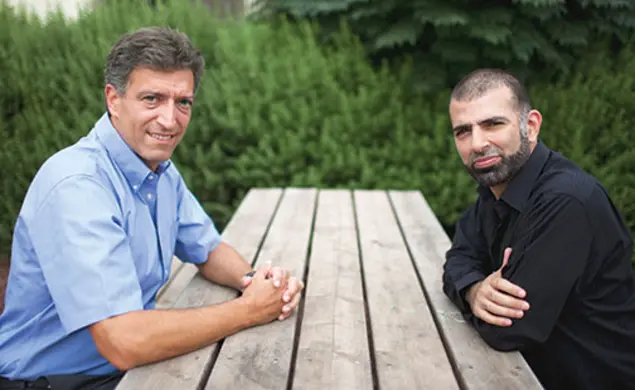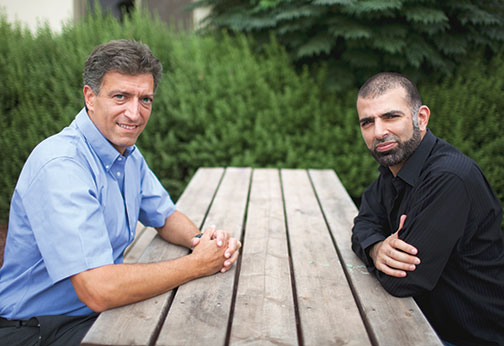Yadin Kaufmann '80: Building High-Tech Bridges
 Yadin Kaufmann ’80, left, runs Sadara Ventures, the first investment fund to focus on Palestinian technology companies, which he founded with a Palestinian partner, Saed Nashef.
Yadin Kaufmann ’80, left, runs Sadara Ventures, the first investment fund to focus on Palestinian technology companies, which he founded with a Palestinian partner, Saed Nashef.Venture capitalist Yadin Kaufmann ’80 has invested in promising startup companies in Israel for the last 30 years. Recently, he noticed that there were several promising technology companies launched by Palestinians, but few ways for those entrepreneurs to work with mentors and develop their businesses.
So last year he started the Palestinian Internship Program, which offers high-tech professionals the opportunity to polish their skills and expand their contacts by working for Israeli and multinational companies. The program — which started with eight interns, most of whom came from the West Bank — is the first to place Palestinians in internships with tech companies in Israel.
Kaufmann, a New Yorker who emigrated to Israel in 1985, worked for several years at Israel’s first venture-capital fund, Athena Venture Partners. He now runs Sadara Ventures, the first investment fund to focus on Palestinian technology companies, which he co-founded with a Palestinian partner, Saed Nashef. The firm is looking to cultivate “the WebMDs and the Booking.coms of the Mideast” and give Palestinian professionals the chance to build their businesses at home, rather than having to emigrate to tech sectors overseas, says Kaufmann, who lives near Tel Aviv with his wife, Lori Banov Kaufmann ’81.
“I noticed a lot of young Palestinians who went to university in the West Bank or Gaza had little opportunity to work in their fields and very little exposure to significant companies in the technology world,” Kaufmann says, even though next door in Israel there are offices for hundreds of high-tech companies, including Google and Intel.
Intern Nadine Handal, who was placed with Intel in Jerusalem, appreciated the chance to have a “unique multicultural experience” that would help her build connections with high-tech professionals and learn problem-solving and innovative-thinking skills, she says. Handal was offered a position with Intel and plans to continue working for the company.
Some interns worried that as Palestinians working in Israel, they could face a backlash back home. MediSafe, a Haifa startup, brought aboard a 29-year-old computer science graduate from Hebron as an intern. While the arrangement worked professionally, the intern requested anonymity in news articles about the program and asked that his face be blurred in publicity photos.
“There is a fairly significant set of pressures against anything perceived to be normalization with Israel on the part of some people in the Palestinian community,” Kaufmann says. “I think that’s unfortunate.” Nonetheless, every member of the first class, which worked through the Gaza war, completed the 10-week internship.
Kaufmann is planning to host 20 interns next summer, and eventually would like to expand to 100. “It does Israel no good when people living a few kilometers away don’t have job prospects or hope in the future,” he says. “If we can create entrepreneurs and jobs and a stake in the economy for talented, young people, that’s got to be a good thing.”
Courtesy TEDxRoma








